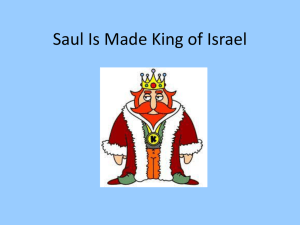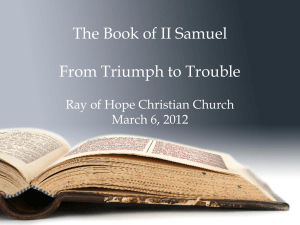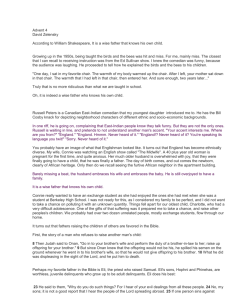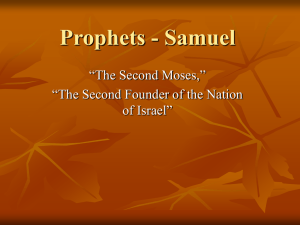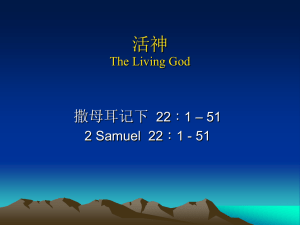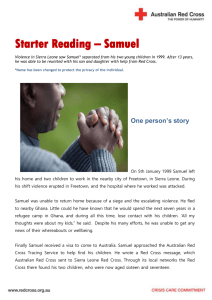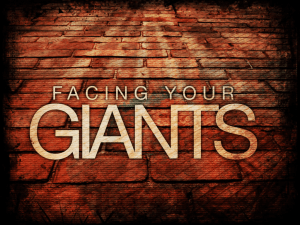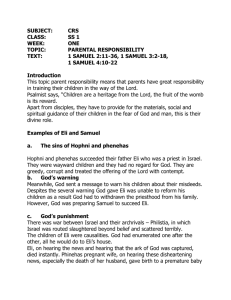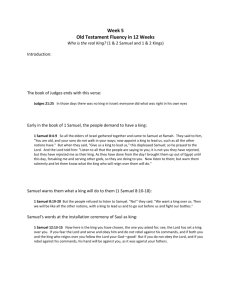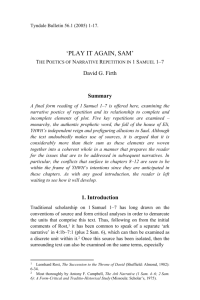Hear and respond to God`s call to us for justice
advertisement
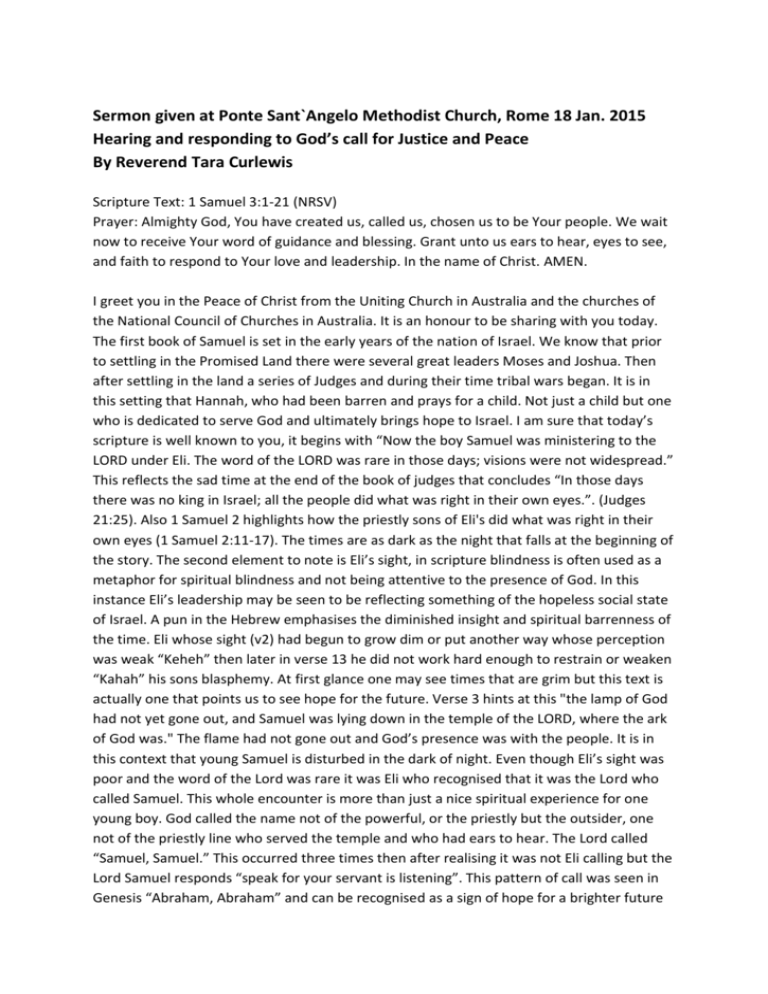
Sermon given at Ponte Sant`Angelo Methodist Church, Rome 18 Jan. 2015 Hearing and responding to God’s call for Justice and Peace By Reverend Tara Curlewis Scripture Text: 1 Samuel 3:1-21 (NRSV) Prayer: Almighty God, You have created us, called us, chosen us to be Your people. We wait now to receive Your word of guidance and blessing. Grant unto us ears to hear, eyes to see, and faith to respond to Your love and leadership. In the name of Christ. AMEN. I greet you in the Peace of Christ from the Uniting Church in Australia and the churches of the National Council of Churches in Australia. It is an honour to be sharing with you today. The first book of Samuel is set in the early years of the nation of Israel. We know that prior to settling in the Promised Land there were several great leaders Moses and Joshua. Then after settling in the land a series of Judges and during their time tribal wars began. It is in this setting that Hannah, who had been barren and prays for a child. Not just a child but one who is dedicated to serve God and ultimately brings hope to Israel. I am sure that today’s scripture is well known to you, it begins with “Now the boy Samuel was ministering to the LORD under Eli. The word of the LORD was rare in those days; visions were not widespread.” This reflects the sad time at the end of the book of judges that concludes “In those days there was no king in Israel; all the people did what was right in their own eyes.”. (Judges 21:25). Also 1 Samuel 2 highlights how the priestly sons of Eli's did what was right in their own eyes (1 Samuel 2:11-17). The times are as dark as the night that falls at the beginning of the story. The second element to note is Eli’s sight, in scripture blindness is often used as a metaphor for spiritual blindness and not being attentive to the presence of God. In this instance Eli’s leadership may be seen to be reflecting something of the hopeless social state of Israel. A pun in the Hebrew emphasises the diminished insight and spiritual barrenness of the time. Eli whose sight (v2) had begun to grow dim or put another way whose perception was weak “Keheh” then later in verse 13 he did not work hard enough to restrain or weaken “Kahah” his sons blasphemy. At first glance one may see times that are grim but this text is actually one that points us to see hope for the future. Verse 3 hints at this "the lamp of God had not yet gone out, and Samuel was lying down in the temple of the LORD, where the ark of God was." The flame had not gone out and God’s presence was with the people. It is in this context that young Samuel is disturbed in the dark of night. Even though Eli’s sight was poor and the word of the Lord was rare it was Eli who recognised that it was the Lord who called Samuel. This whole encounter is more than just a nice spiritual experience for one young boy. God called the name not of the powerful, or the priestly but the outsider, one not of the priestly line who served the temple and who had ears to hear. The Lord called “Samuel, Samuel.” This occurred three times then after realising it was not Eli calling but the Lord Samuel responds “speak for your servant is listening”. This pattern of call was seen in Genesis “Abraham, Abraham” and can be recognised as a sign of hope for a brighter future not just for an individual but for God’s people. The response of the outsider Samuel as he speaks out about the injustice exhibited by Eli’s sons starts Israel on a new path. The tendency of the powerful to take advantage of the vulnerable is a chief concern of Samuel and still exists in many parts of the world today. In December 2010 I was part of the WCC Living Letters team (outsiders) visiting the Philippines. We had been invited to listen to the people’s stories of how they are at the mercy of the powerful and their human rights were being violated. We listened to the people whose relatives had been killed or disappeared because they spoke out against injustice. We listened to the farmers who lived on less than $2.00 a day because their land had been taken from them and others benefited from the profits of their labour. We listened to the families of 43 volunteer health care workers who were arrested while undergoing first responder training at Morong. They had been detained by the military for 10 months with no sign of release. We visited the 43 in prison and heard their story. I can tell you, you never want to be in a Filipino gaol. There was no good news in anything we heard. I clearly recall how on the flight from Sydney to Manila I thought what difference can we a group of outsiders make in just 3 days? Having heard the stories of dark days for the poor in the Philippines in the midst of a culture of impunity we outsiders made representation to the Secretary for Justice. After meeting with Secretary De Lima she took a memorandum to the President, who up to this point had washed his hands of involvement. She expressed her hope of a positive outcome by Christmas. For the people the visit of these outsiders had brought a sign of hope. They speak of seeing God’s presence with them through this WCC living letters visit. A week after returning home on 10 December, International Human Rights day the news came that President Aquino had ordered the department of justice to do all that was necessary for the 43 to be released. I thought that might mean release in January, miraculously in another week on 17 December at midnight they were released. What difference can be made in three short days, ears can be opened, and prisoners have hope of release due to the united voices and actions of the churches. As people of faith we know that in three short days Jesus entered the tomb and on the third day God raised him to resurrected life. The poor and powerless are still at the mercy of the strong. Human appetite still destroys lives and livelihood. I believe that the task of the church or churches working together is twofold: 1. to cry out against injustice and the abuse of power in the world, and 2. to hear and respond with humility to the message of judgment that challenges our own practices. Currently in Australia past practices of the church are being challenged through the Royal Commission into Institutional response to child sex abuse. The response of the church in the past did not always uphold justice for the abused. In some places it protected the perpetrator whilst seeking to silence the victim. This occurred in many places and is not confined to Australia or even one particular denomination. The churches practices are being challenged and processes for dealing with allegations of abuse will require greater transparency, better checks and balances are being implemented for all who work with children and consideration is now being given to what forms of redress and compensation are to be introduced and provided to survivors. Still in Australia the practice of the past to remove children from aboriginal families and communities resulting in what is now known as the Stolen Generation is now seen as an exercise of power over our indigenous people by the colonisers. This practice has been challenged and as a nation we are on a journey that hopefully one day will see healing, reconciliation and recognition of the first peoples of our land. In recent weeks we have seen the effects of radical extremism in Sydney, Paris and Nigeria, the first two have received front page coverage around the world and the latter Baga in Nigeria where 2000 people have been killed by Boko Haram militants is hardly visible in the media. Why because even the Nigerian Government is doing little to contain the injustices that are taking place. In recent times the eyes of many in the world are on the Vatican and see many of the actions of His Holiness Pope Francis as seeking to address the divisions caused by misuse of power in the church and also highlight the misuse of power by governments that have been at the expense of the poor. Hearing God’s call and responding is not always easy. For the people of old moving into the Promised Land did not guarantee a perfect life, neither does God's call to us or the church today. God's words to Samuel were hard to hear and even harder to speak to others, for they involved judgment against Eli's own children. Like Samuel, and others such as Isaiah, and Jeremiah, God's call often involves working to change human systems that are broken, and may lead us down difficult paths. Last year the G20 nations met in Australia and the voice of civil society was invited to participate in shaping the outcomes, one of many significant contributions related to transparency of governments and business. Countries have now committed to businesses paying tax in the country where the profits are earned and implementing accountability of nations. In recognising that the world and the church are far from perfect the World Council of Churches invites us and the churches to join the pilgrimage of justice and peace. In hearing the injustice that exists often in subtle ways in families, neighbourhoods, communities, in work places, in nations and the church, each one of us can respond. We may think we can’t make a difference but we can. Holding up the values of justice and peace in all that we do makes a difference. Today the churches in the northern hemisphere commence the Week of Prayer for Christian Unity, the path to unity has twists and turns yet when we speak and act together our unity can transform injustices and lead to peace. God's call comes when we least expect it and often to those we least expect. God is always the God of surprises. We, as the church, need to be like Eli, encouraging everyone to hear the voice that calls them forth to be the people they are created to be. At the same time, we help each other to tell the truth, even when the truth is hard to hear and in this we are to be like Samuel. May you hear and respond to God’s call for justice and peace.

